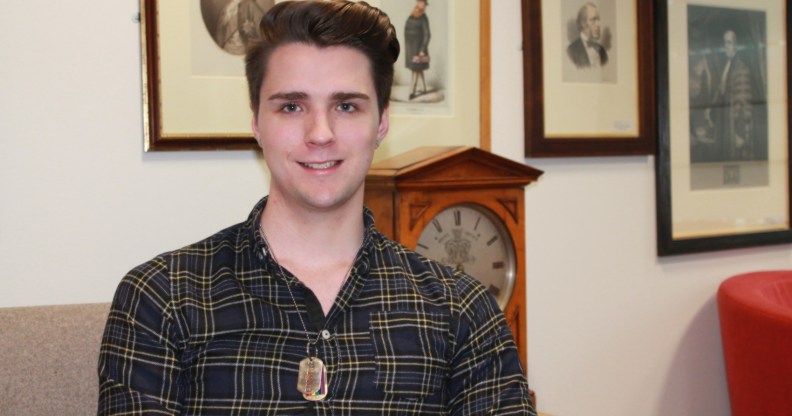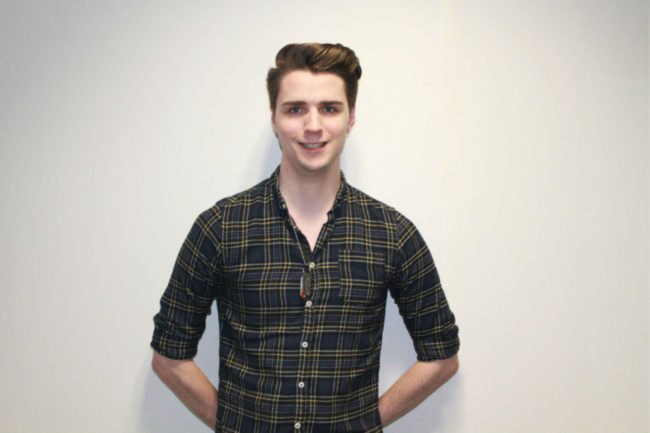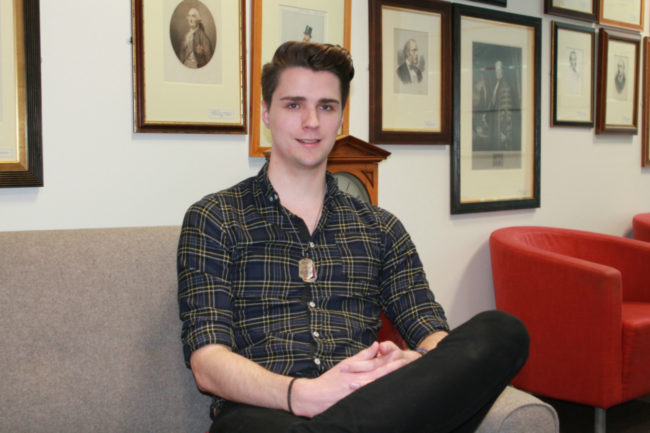This domestic abuse survivor broke free from a controlling, violent relationship

Domestic violence survivor Matt (Photo: Nick Duffy)
A domestic violence survivor speaks about how he overcame an abusive queer relationship, as the Home Office this week announced plans to provide funding to support LGBT+ domestic violence survivors.
Matt Lloyd had been with his partner for a year and a half when he was convinced to move from Birmingham to start a new life with him in London.
However, Matt soon found himself alienated from his family and friends, while his partner grew steadily more controlling.
“It started with small things.”
”It started with small things,” Matt explained, “like deleting dating apps and saying, ‘You’re with me now.’
“He got my passwords, and it became normal for him to check through my phone.”
As their relationship progressed, the situation began to escalate.
“It became normal for him to escort me any time I went to see anyone,” Matt said.
“I was only allowed to make friends with his friends and the people he ‘approved.’
“He would repeatedly tell me [my friends] are terrible people, so I became more and more alienated.”

Domestic violence survivor Matt Lloyd (Photo: Nick Duffy)
Matt initially did not recognise signs of an abusive relationship, however, even as his partner grew more and more controlling.
He recalled: “It then got to the point where he would turn violent on nights out.
“He would shout a lot of abuse at me and get incredibly drunk, which would only multiply the effects of the violence and abuse. It would get to the point where he would smash things.
“It escalated from the small point of taking over control, to then becoming very violent, very abusive.”
The domestic violence quickly escalated
Matt said there was one specific tipping point that led to his decision to leave.
He recalled: “He had done his usual thing at the club, where he had fallen out with me, shouted abuse at me, and told me that I should go and find someone else to sleep with tonight, because he was locking the door and wasn’t going to let me back in.
“I went and stayed with a friend, and returned two days later. I saw on the wall there were lots of dents, where someone had smashed into the wall.
“My housemate said, ‘When your partner got home he took his phone and smashed it into the wall,’ and when I saw the wall, that’s the moment I realised.
“I thought, ‘Oh my god,’ and realised what was happening.”
Although he was alone and new to London, Matt immediately made the decision to get out.
He packed a bag and left, breaking off the relationship for good.
After leaving his partner, Matt found himself without a home and without friends
Matt recalled that the abrupt exit from their shared home, coupled with his alienation from nearly all of his friends, left him facing the risk of homelessness.
He said: “I had two friends [in London] who I would now call part of my queer family, but because they’d been so alienated by him, it took a lot for me to reach out to them.”
The end of the relationship did not stop Matt’s ex-partner from trying to exert control over him, however.

Domestic violence survivor Matt Lloyd (Photo: Nick Duffy)
He said: “Because I was so desperate, I found housing with someone from the queer scene, but my former partner made friends with him.
“Two days after I moved in, I walked into the living room, and my former partner was there having drinks with my landlord.”
“He threatened me,” Matt recalled of another incident, “and said that if I was ever in the clubs or pubs that he was in, then he would attack me.”
LGBT+ anti-violence charity Galop helped Matt break the cycle of abuse
Matt turned to the internet for help, and found himself directed to Galop, the LGBT+ anti-violence charity.
He said: “I called the hotline, and I’ll never forget the voice of the person who answered.
“I wasn’t sure what to say, and they said, ‘Let’s talk about how you’re feeling right now.’
“We chatted about what had happened. The support I was given by them was amazing.”
Galop was a lifeline for Matt, particularly during the period in which he was still experiencing harassment from his ex.
He added: “They helped me to apply for a non-molestation order, gave me the confidence to go to the police, and talked me through what would happen in court.
“They referred me to a barrister, who was amazing, and offers discounts to people referred through Galop.”
“They also assigned me a domestic violence advocate, who I had monthly meetings with,” added Matt.
“It was through those meetings that I [processed] that this was domestic abuse, and we would have to go to court to make sure this ended.”
Matt said that although his ex had violated the non-molestation order, the abuse has finally ended following the subsequent legal action.
Gay men are ‘twice as likely’ to face domestic violence
According to data from the Crime Survey for England and Wales, gay men are more than twice as likely to suffer domestic abuse compared to straight men.
Male domestic abuse survivors are also far less likely to come forward, while LGBT+ people who experience domestic abuse face particular barriers to accessing support.
Matt said: “I think it is all about gender and gender norms, and the idea that if you’re a man you have to be strong and brave, you have to go out there and be the breadwinner.
“I think the queer community does inherit some of these stereotypes, and that is probably one of the reasons why it goes less reported.
“We feel like we shouldn’t be victims, when it’s in all our interests that we smash these gender roles and challenge these prejudices.”
Home Office pledges funding to help LGBT+ domestic violence survivors
The new Home Office strategy for tackling Violence Against Women and Girls, set out on Wednesday (March 6), includes £500,000 in new funding for specialist LGBT domestic abuse organisations and includes commitments to develop guidance for supporting LGBT+ survivors.
Matt said: “I think it’s good start, and welcome engagement that they’ve had with the queer community.
“I’m glad that it’s becoming more of a priority for all levels of government.
“I think we have to see what impact it has on the figures—[if] we see the levels of domestic violence reducing in the queer community, if we see more people in the queer community willing to come forward and speak to the police.”
Matt now frequently speaks out about his experiences, and wants to make sure the voice of all survivors is heard.
He said: “It’s only when it happened to me that I was like, ‘Oh my god, someone needs to do something about this.’
“It’s a struggle, but it’s also very empowering to become more public about what happened.
“They don’t want you to speak out, and it is their final control over you gone when you are speaking out.”

